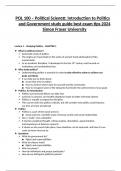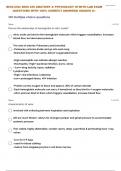POL 100 – Political Science: Introduction to Politics
and Government study guide best exam tips 2024
Simon Fraser University
Lecture 1 – Studying Politics – CHAPTER 1
❖ What is political science?
➢ Systematic study of politics
➢ The origins are traced back to the works of ancient Greek philosophers Plato
and Aristotle
➢ As an academic discipline, it developed in the late 19th century and focused on
institutions and constitutional law.
❖ Why study politics?
➢ Understanding politics is essential in order to take effective action to achieve our
goals and ideals.
➢ It can help you to think about:
▪ Issues that arise in politics
▪ How to achieve what is best for yourself and the community
▪ How to recognize some of the obstacles that hinder the achievement of your goals
❖ Politics: An Introduction
➢ Politics surround and affects our daily lives
➢ Cynicism is common, but healthy skepticism leads to better informed citizens
➢ Politics is actually a progressive discipline
➢ This course looks into politics critically, but will consider how politics could improve
our lives at home and abroad
❖ Politics
➢ Politics is a part of the social sciences
▪ Social sciences: scientific study of human society and social relationships
➢ Not a “trade”, but a discipline
➢ It teaches analytical thought, critical analysis, description, argumentation,
and importance of balances research
➢ It shows us why events take place, how situations can be improved, and how it is we
come to know what we do
❖ Questions
➢ What do government do?
▪ Rights and responsibilities
➢ What do citizens want?
▪ Rights and responsibilities
➢ Who has power?
➢ How do individuals and groups participate?
➢ How do we distinguish political systems?
,➢ Why is conflict so prevalent in the world?
➢ How is wealth distributed?
➢ Why does such inequity exist?
, ➢ Harold Lasswell neatly describes the fundamental question of politics in his book
▪ Politics: Who get what, when, how?
❖ Liberal Democracy?
➢ How decisions are made and carried out depends on your political system
➢ Two main types looked at in this course:
▪ Liberal Democracy: a political system based on freedom, individual liberty, and the
principle that governance requires the assent of all citizens through participation
in the electoral process, articulation of views, and direct or indirect representation
in governing institutions.
▪ Authoritarianism: political system requiring absolute obedience to a constituted
authority.
❖ Basic Concepts: Power
➢ Power is often defied as the ability to achieve an objective by influencing the behavior
of others.
➢ The resources that give individuals and groups the potential to exert political power are
unequally distributed
➢ Power is often thought of in terms of some having power over others, or in a
more positive way as the power to achieve collective goals.
➢ Political power ca be exerted in different ways:
▪ Through coercion, which involves using fear or threats of harmful consequences
to achieve an outcome
▪ Through inducements, which involves achieving an outcome by offering a reward or
bribe.
▪ Through persuasion, which may involve the use of truthful information to
encourage people to act in accordance with their own interests, or the use of
misleading information to manipulate people
❖ Basic concepts: authority and legitimacy
➢ Authority represents the right to exercise power that is accepted by those
being governed as legitimate.
➢ Max Webber describes three basic types of authority (charismatic, traditional, legal-
rational) each of which could try to establish its legitimacy in its own way.
➢ A government whose rule is considered legitimate can rely more on authority than
on coercion to get people to obey laws.
❖ Basic concepts: the common good
➢ Ideally politics is about pursuing the common good of a political community
➢ In the contemporary world, democracy is seen as the form of government most likely
to actually pursue the common good
➢ The common good of the country may not be the same as the common good of other
political communities to which we belong (i.e. local, provincial, global)
❖ Approaches to politics
➢ Like any field, politics has many different methods and approaches
, ➢ These are based on the rich history of political thoughts and ideologies
➢ Aristotle said humans possess “logos” which means we reason, and we communicate
➢ Justice in society is our goal
▪ Injustice often exists instead
❖ Empirical, Normative and Policy Analysis
➢ Empirical analysis involves explaining various aspects of politics, particularly by
using observation and comparison to develop generalization
➢ Normative analysis includes examining ideas about how the community should be
governed and what values should be pursued through politics
➢ Policy analysis involves evaluating existing policies and assessing possible alternatives
to deal with particular problems
❖ Analytical Approach
➢ Also called the “traditional approach”
▪ Analytical approach: perspective that views politics as an empirical (that can be
observed) discipline, rather than a science; politics cannot be broke down into
parts, but must be seen comprehensively.
➢ Oldest approach in politics
➢ Sees politics as a comprehensive study, based on empiricism
❖ Behaviouralism
➢ After WWII, universities were pressured by governments to spend more on sciences
➢ That affected social sciences, too
➢ Politics was urged to be more rigorous and use the ‘scientific method’
❖ Scientific Method
➢ Using variable, theories, axioms, and hypotheses in research
➢ Rigour, where accuracy is sought through consistency, testing, and use of
accepted principles, laws and approaches
➢ Focus on the tangible, rather than the values
▪ Humans and human behavior
➢ Behaviouralism: perspective that concentrates on the ‘tangible’ aspects of political
life, rather than values; objective was to establish a discipline that was ‘scientific’ and
objective
❖ Post-Behaviouralism
➢ Understood that values cannot be ignored
➢ Post-Behaviouralism brought values back in
▪ Post-Behaviouralism: approach that attempted to reconcile the problems
encountered by Behaviouralism by allowing for values and ideology in its
analysis
➢ The human is the focus of attention, so human sentiment and views cannot be removed
❖ Structural-functionalism
➢ Politics is not just about behavior
➢ Importance of institutions and their functions





